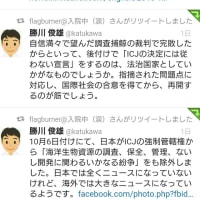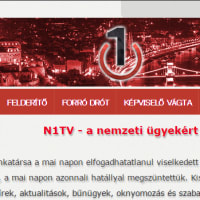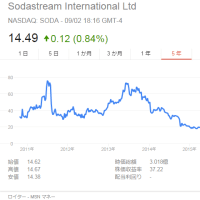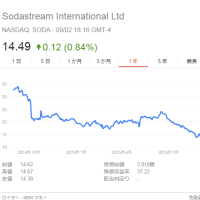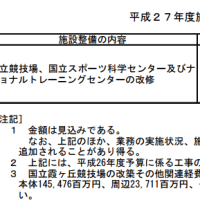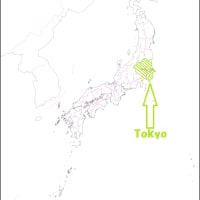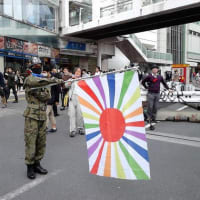今回は、CAMERA の方々に Wikipedia の項目改編を呼びかけた e-mail の引用。
思いっっっっっっ切り手抜きな更新なのは勘弁して・・・。
・CAMERA Seeks 10 Volunteers to Submit Info to Wikipedia(2008年4月21日 electronicintifada.net;.pdfファイル)
↑の P.2-4 に載っていた Gilead Ini 氏の e-mail を引用しておく。
ただし、e-mail アドレスの一部を全角文字に変更しておいた。
---- 以下引用 ----
Wikipedia and CAMERA
From: Gilead Ini (gilead@camera.org)
Sent: Mon 3/17/08 2:35 PM
To: Gilead Ini (gilead@camera.org)
Shalom Wikipedia Editors and CAMERA E-Mail Team,
Thank you all for responding to the latest alert about editing Wikipedia, the online encyclopedia.
We know that your time is valuable, and very much appreciate your willingness to spend some of it in the quest for fairness and accuracy on Wikipedia.
And considering the truly impressive quantity and quality of volunteers, 11m extremely hopeful that we can and will meet this goal.
Let me begin by addressing a couple of questions that some of you asked.
* First, while our alert noted that we are seeking ten volunteers, what we really meant was that we want at least ten.
I'm happy to say that we currently have about five times that many!
* Another common question was: How much time do I need to devote to this project?
The easy answer is: As much as you decide to devote.
There is no minimum amount of time required to edit Wikipedia.
Some of you will only be able to participate periodically, and others will be able to weave
this into their daily routine.
Whatever amount of time you can spare to learn about and edit Wikipedia will be extremely valuable.
Every little bit helps.
That said, I'll also point out that improving articles will sometimes require patience and persistence.
Fortunately, patience and persistence between 40 people is a good bit easier than patience and persistence by one person.
Because Wikipedia articles often change, and are never finalized, we do hope that this will be a long term project.
This is a marathon, not a sprint.
* The final common query was: Okay, so what do I do? How does Wikipedia editing work?
A few of you already have experience editing Wikipedia.
For all the others, I'll address the technical aspect of editing Wikipedia a little bit later.
But first, 11 11 touch on a few broader, non-technical ideas that are based on my experience with Wikipedia, and on the advice passed onto me by some of the more experienced Wiki editors on this list.
Why are we even concerned with Wikipedia?
Because Wikipedia is extremely popular, influential, and depends on the participation of fair-minded members of the community in order to work well.
What is the problem?
It's influential and popular, but it isn't always accurate.
Wikipedia has a series of policies and guidelines meant to ensure that the encyclopedia develops in a fair, accurate and reasonable manner.
Unfortunately, these gUidelines are often ignored by editors (even while these same editors loudly and speciously cite these guidelines in order to defend their unfair edits).
And as we all know,"controversial" topics like the Arab-Israeli conflict tend to attract an especially large number of
partisans hoping to warp the public's understanding of the Middle East.
This is happening with many Wikipedia articles, ranging from the article about CAMERA, to the article about Nablus, to
various articles about anti-Israel activists, and beyond.
Who are we?
It's best to think of ourselves as a collection of individuals and individual Wikipedia editors interested in discussion about Wikipedia.
This encyclopedia is intended to be written and edited by individuals -- not by groups -- and that's what we'll do.
At the same time, by having discussions within our group, we can learn about, discuss, and figure out how to overcome the challenges we each encounter as Wikipedia editors.
There is no reason to advertise the fact that we have these group discussions.
Anti-Israel editors will seize on anything to try to discredit people who attempt to challenge their problematic assertions, and will be all too happy to pretend, and announce, that a 'Zionist' cabal (the same one that controls the banks and Hollywood?) is trying to hijack Wikipedia.
The Wikipedia community
We also should keep in mind that we are part of a larger, well-established, Wikipedia community.
And while there are loud and aggressive groups of anti-Israel editors, most of the Wikipedia community is made up of well-meaning people who often don't know much about the Arab-Israeli conflict.
It is important that these people -- our potential allies -- understand that we, too, are concerned with thoughtfully contributing to, and improving, Wikipedia.
First and foremost, that means having a history of working within the Wikipedia guidelines.
(Note that anyone on Wikipedia can view your editing history.)
These guidelines are explained on the Wikipedia website, but I will also discuss some of them a bit later.
Obviously, it's also important to remain civil when arguing ideas on the Wikipedia discussion pages -even when people inevitably try to provoke you into an online shouting match.
It's helpful, if possible, to build relationships.
(Fortunately, we now have in this group a built in network of relationships. Nonetheless, it's still helpful to make relationships with established editors, and with super-editors know as 'administrators. ')
It's important, after making changes on a Wikipedia article page, to explain these edits on Wikipedia's discussion pages.
(I'll address the technical details on how exactly to do this later. For now, let's stick with MI<conceptual It's very important to avoid framing our arguments in terms of the Mideast conflict, but rather to frame them in terms of Wikipedia's gUidelines.
So, for example, imagine that you get rid of or modify a problematic sentence in an article alleging that "Palestinian become suicide bombers to respond to Israel's oppressive policies."
You should, in parallel, leave a comment on that article's discussion page (either after or before making the
change).
Avoid defending the edit by arguing that "Israel's policies aren't 'oppression,' they are defensive.
And anyway Palestinians obviously become suicide bombers for other reasons, for example hate education!"
Instead, describe how this sentence violates Wikipedia's policies and guidelines.
One of the core policies is that assertions should adhere to a Neutral Point of View, usually abbreviated NPOV.
(The opposite of NPOV is POV, or Point of View, which is basically another way of saying subjective statement, or opinion.)
So it would be best to note on the discussion page that "This sentence violates Wikipedia's NPOV policy, since the description of Israel's policies as 'oppressive'is an opinion.
In addition, it is often noted by Middle East experts that one of the reasons Palestinians decide to become suicide bombers is hate education and glorification of martyrdom in Palestinian society.
I will add (or have added) a sentence to that effect, and cite it with a footnote pointing to one or more of these experts' articles." (Or something along those lines.)
A veteran Wikipedia editor on this list has suggested that, after setting up your account, avoid editing Israel-related articles for a short period of time; or in the very least, try to edit articles unrelated to Israel more than articles related to Israel.
This isn't a bad idea, not only to avoid the appearance of being one-topic editors, but also because it would be easier to practice editing, and to learn about Wikipedia, far from the Mideast hornet's nest.
You might practice by visiting and editing articles about other topics that interest you.
Editing could mean simply fixing typos and grammar, or it could mean adding (footnoted) sentences to these topics.
This way, you can gain experience without having anti-Israel partisans jumping down your throat.
When signing up for a Wikipedia account, you might also want to avoid, for obvious reasons, picking a
user name that marks you as pro-Israel, or that lets people know your real name.
Anonymity is an accepted part of Wikipedia.
Also, for the sake of greater anonymity, don't forget to always log in before making changes.
If you make changes while not logged in, Wikipedia will record your computer's IP address.
What now?
Now that we've considered some thoughts on Wikipedia, we're almost ready to act!
You will soon get via email an invitation to join a Google Group entitled Isra-pedia.
Itis there that we'll discuss problematic Wikipedia pages, and how to improve them.
You'll also find there a copy of this welcome email, a tutorial on how to sign up for and edit Wikipeida (i.e. those technical details that I avoided discussion in this email), and an Action Items page.
Those of you who already have a Wikipedia account and are familiar with the editing process can ignore the tutorial and focus on the action items and the discussion section of our Google Groups page.
I look forward to working with all of you.
Sincerely,
Gilead Ini
Senior Research Analyst
CAMERA
Action Item:
When you get the invitation to a Google Group called Isra-pedia, accept the invite!
---- 引用以上 ----
補足しておくが、Ini 氏が教えた手段は Wikipedia のルールには違反してない点に注意。
実に巧妙な手段である。
だからといって、日本の Wikipedia でも無闇に真似する奴が出て欲しく無いが・・・。
思いっっっっっっ切り手抜きな更新なのは勘弁して・・・。
・CAMERA Seeks 10 Volunteers to Submit Info to Wikipedia(2008年4月21日 electronicintifada.net;.pdfファイル)
↑の P.2-4 に載っていた Gilead Ini 氏の e-mail を引用しておく。
ただし、e-mail アドレスの一部を全角文字に変更しておいた。
---- 以下引用 ----
Wikipedia and CAMERA
From: Gilead Ini (gilead@camera.org)
Sent: Mon 3/17/08 2:35 PM
To: Gilead Ini (gilead@camera.org)
Shalom Wikipedia Editors and CAMERA E-Mail Team,
Thank you all for responding to the latest alert about editing Wikipedia, the online encyclopedia.
We know that your time is valuable, and very much appreciate your willingness to spend some of it in the quest for fairness and accuracy on Wikipedia.
And considering the truly impressive quantity and quality of volunteers, 11m extremely hopeful that we can and will meet this goal.
Let me begin by addressing a couple of questions that some of you asked.
* First, while our alert noted that we are seeking ten volunteers, what we really meant was that we want at least ten.
I'm happy to say that we currently have about five times that many!
* Another common question was: How much time do I need to devote to this project?
The easy answer is: As much as you decide to devote.
There is no minimum amount of time required to edit Wikipedia.
Some of you will only be able to participate periodically, and others will be able to weave
this into their daily routine.
Whatever amount of time you can spare to learn about and edit Wikipedia will be extremely valuable.
Every little bit helps.
That said, I'll also point out that improving articles will sometimes require patience and persistence.
Fortunately, patience and persistence between 40 people is a good bit easier than patience and persistence by one person.
Because Wikipedia articles often change, and are never finalized, we do hope that this will be a long term project.
This is a marathon, not a sprint.
* The final common query was: Okay, so what do I do? How does Wikipedia editing work?
A few of you already have experience editing Wikipedia.
For all the others, I'll address the technical aspect of editing Wikipedia a little bit later.
But first, 11 11 touch on a few broader, non-technical ideas that are based on my experience with Wikipedia, and on the advice passed onto me by some of the more experienced Wiki editors on this list.
Why are we even concerned with Wikipedia?
Because Wikipedia is extremely popular, influential, and depends on the participation of fair-minded members of the community in order to work well.
What is the problem?
It's influential and popular, but it isn't always accurate.
Wikipedia has a series of policies and guidelines meant to ensure that the encyclopedia develops in a fair, accurate and reasonable manner.
Unfortunately, these gUidelines are often ignored by editors (even while these same editors loudly and speciously cite these guidelines in order to defend their unfair edits).
And as we all know,"controversial" topics like the Arab-Israeli conflict tend to attract an especially large number of
partisans hoping to warp the public's understanding of the Middle East.
This is happening with many Wikipedia articles, ranging from the article about CAMERA, to the article about Nablus, to
various articles about anti-Israel activists, and beyond.
Who are we?
It's best to think of ourselves as a collection of individuals and individual Wikipedia editors interested in discussion about Wikipedia.
This encyclopedia is intended to be written and edited by individuals -- not by groups -- and that's what we'll do.
At the same time, by having discussions within our group, we can learn about, discuss, and figure out how to overcome the challenges we each encounter as Wikipedia editors.
There is no reason to advertise the fact that we have these group discussions.
Anti-Israel editors will seize on anything to try to discredit people who attempt to challenge their problematic assertions, and will be all too happy to pretend, and announce, that a 'Zionist' cabal (the same one that controls the banks and Hollywood?) is trying to hijack Wikipedia.
The Wikipedia community
We also should keep in mind that we are part of a larger, well-established, Wikipedia community.
And while there are loud and aggressive groups of anti-Israel editors, most of the Wikipedia community is made up of well-meaning people who often don't know much about the Arab-Israeli conflict.
It is important that these people -- our potential allies -- understand that we, too, are concerned with thoughtfully contributing to, and improving, Wikipedia.
First and foremost, that means having a history of working within the Wikipedia guidelines.
(Note that anyone on Wikipedia can view your editing history.)
These guidelines are explained on the Wikipedia website, but I will also discuss some of them a bit later.
Obviously, it's also important to remain civil when arguing ideas on the Wikipedia discussion pages -even when people inevitably try to provoke you into an online shouting match.
It's helpful, if possible, to build relationships.
(Fortunately, we now have in this group a built in network of relationships. Nonetheless, it's still helpful to make relationships with established editors, and with super-editors know as 'administrators. ')
It's important, after making changes on a Wikipedia article page, to explain these edits on Wikipedia's discussion pages.
(I'll address the technical details on how exactly to do this later. For now, let's stick with MI<conceptual It's very important to avoid framing our arguments in terms of the Mideast conflict, but rather to frame them in terms of Wikipedia's gUidelines.
So, for example, imagine that you get rid of or modify a problematic sentence in an article alleging that "Palestinian become suicide bombers to respond to Israel's oppressive policies."
You should, in parallel, leave a comment on that article's discussion page (either after or before making the
change).
Avoid defending the edit by arguing that "Israel's policies aren't 'oppression,' they are defensive.
And anyway Palestinians obviously become suicide bombers for other reasons, for example hate education!"
Instead, describe how this sentence violates Wikipedia's policies and guidelines.
One of the core policies is that assertions should adhere to a Neutral Point of View, usually abbreviated NPOV.
(The opposite of NPOV is POV, or Point of View, which is basically another way of saying subjective statement, or opinion.)
So it would be best to note on the discussion page that "This sentence violates Wikipedia's NPOV policy, since the description of Israel's policies as 'oppressive'is an opinion.
In addition, it is often noted by Middle East experts that one of the reasons Palestinians decide to become suicide bombers is hate education and glorification of martyrdom in Palestinian society.
I will add (or have added) a sentence to that effect, and cite it with a footnote pointing to one or more of these experts' articles." (Or something along those lines.)
A veteran Wikipedia editor on this list has suggested that, after setting up your account, avoid editing Israel-related articles for a short period of time; or in the very least, try to edit articles unrelated to Israel more than articles related to Israel.
This isn't a bad idea, not only to avoid the appearance of being one-topic editors, but also because it would be easier to practice editing, and to learn about Wikipedia, far from the Mideast hornet's nest.
You might practice by visiting and editing articles about other topics that interest you.
Editing could mean simply fixing typos and grammar, or it could mean adding (footnoted) sentences to these topics.
This way, you can gain experience without having anti-Israel partisans jumping down your throat.
When signing up for a Wikipedia account, you might also want to avoid, for obvious reasons, picking a
user name that marks you as pro-Israel, or that lets people know your real name.
Anonymity is an accepted part of Wikipedia.
Also, for the sake of greater anonymity, don't forget to always log in before making changes.
If you make changes while not logged in, Wikipedia will record your computer's IP address.
What now?
Now that we've considered some thoughts on Wikipedia, we're almost ready to act!
You will soon get via email an invitation to join a Google Group entitled Isra-pedia.
Itis there that we'll discuss problematic Wikipedia pages, and how to improve them.
You'll also find there a copy of this welcome email, a tutorial on how to sign up for and edit Wikipeida (i.e. those technical details that I avoided discussion in this email), and an Action Items page.
Those of you who already have a Wikipedia account and are familiar with the editing process can ignore the tutorial and focus on the action items and the discussion section of our Google Groups page.
I look forward to working with all of you.
Sincerely,
Gilead Ini
Senior Research Analyst
CAMERA
Action Item:
When you get the invitation to a Google Group called Isra-pedia, accept the invite!
---- 引用以上 ----
補足しておくが、Ini 氏が教えた手段は Wikipedia のルールには違反してない点に注意。
実に巧妙な手段である。
だからといって、日本の Wikipedia でも無闇に真似する奴が出て欲しく無いが・・・。











